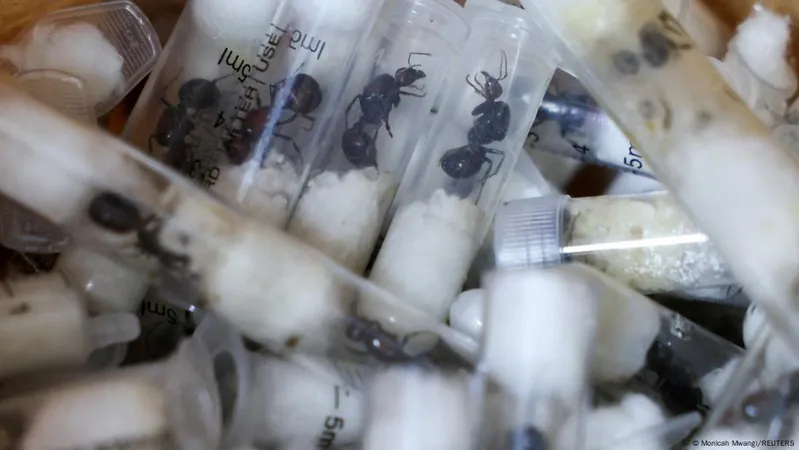
Shocking Ant Smuggling Case: Belgian Teens Face Justice in Kenya!
2025-04-16
Author: Jia
A Startling Case of Wildlife Trafficking
In a surprising turn of events, Kenyan authorities have taken four individuals, including two Belgian teenagers, to court over bizarre wildlife piracy charges linked to ant smuggling.
Shifting Trends in Wildlife Trafficking
While the smuggling of iconic animals like elephants and rhinos has been a longstanding issue in Kenya, the Kenya Wildlife Service (KWS) notes a troubling trend: traffickers are now turning their sights to lesser-known species that are crucial to the ecosystem.
What Happened?
On April 5, two 19-year-old Belgians were arrested with a staggering 5,000 live Messor Cephalotes ants, also known as Giant African Harvester Ants, cleverly packed in 2,244 syringes and test tubes. Authorities believe the unique packaging was designed to keep the ants alive for extended periods while dodging airport security checks.
The Value and Demand for Rare Ants
Authorities placed a hefty price tag of 1 million shillings (roughly $7,700) on the seized ants. By employing cotton wool to ensure their survival, the suspects demonstrated a premeditated smuggling operation aimed at tapping into the lucrative exotic pet market in Europe and Asia.
Who Else is Involved?
In addition to the Belgian teens, a Vietnamese and a Kenyan were also arrested in Nairobi with another 400 ants, highlighting the broader implications of this illegal trade.
The Teens' Defense in Court
During court proceedings, both Belgian teens pleaded guilty, claiming they were unaware of the illegality of their actions. One suspect lamented, "We did not come here to break any laws. By accident and stupidity we did," appealing for the court's mercy.
The Allure of the Giant African Harvester Ant
Known for their vibrant red and brown coloration, these ants are considered treasures by collectors for their fascinating behaviors and unique colony-building skills. Retailers even describe owning a queen ant as a dream for enthusiasts.
Implications of Illegal Trafficking
The KWS pointed out that the illegal trade not only threatens Kenya's biodiversity but also robs local communities of potential benefits from sustainable resource use.
What Lies Ahead?
As the case resumes on April 23, the four suspects remain in custody, drawing attention to the ongoing issues surrounding wildlife trafficking and the demand for rare species.






 Brasil (PT)
Brasil (PT)
 Canada (EN)
Canada (EN)
 Chile (ES)
Chile (ES)
 Česko (CS)
Česko (CS)
 대한민국 (KO)
대한민국 (KO)
 España (ES)
España (ES)
 France (FR)
France (FR)
 Hong Kong (EN)
Hong Kong (EN)
 Italia (IT)
Italia (IT)
 日本 (JA)
日本 (JA)
 Magyarország (HU)
Magyarország (HU)
 Norge (NO)
Norge (NO)
 Polska (PL)
Polska (PL)
 Schweiz (DE)
Schweiz (DE)
 Singapore (EN)
Singapore (EN)
 Sverige (SV)
Sverige (SV)
 Suomi (FI)
Suomi (FI)
 Türkiye (TR)
Türkiye (TR)
 الإمارات العربية المتحدة (AR)
الإمارات العربية المتحدة (AR)